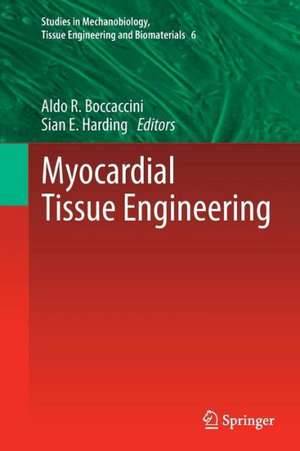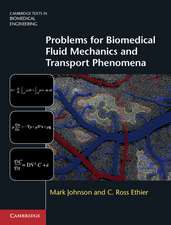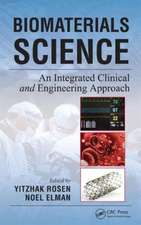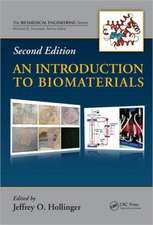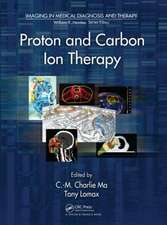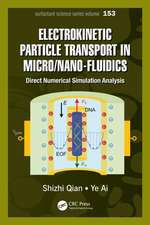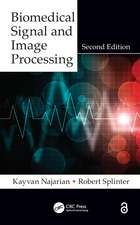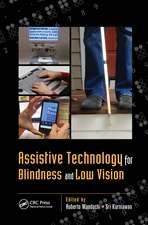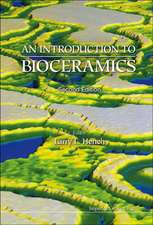Myocardial Tissue Engineering: Studies in Mechanobiology, Tissue Engineering and Biomaterials, cartea 6
Editat de Aldo R. Boccaccini, Sian Hardingen Limba Engleză Paperback – 11 noi 2013
| Toate formatele și edițiile | Preț | Express |
|---|---|---|
| Paperback (1) | 1093.35 lei 6-8 săpt. | |
| Springer Berlin, Heidelberg – 11 noi 2013 | 1093.35 lei 6-8 săpt. | |
| Hardback (1) | 1100.30 lei 6-8 săpt. | |
| Springer Berlin, Heidelberg – 31 aug 2011 | 1100.30 lei 6-8 săpt. |
Din seria Studies in Mechanobiology, Tissue Engineering and Biomaterials
- 5%
 Preț: 681.26 lei
Preț: 681.26 lei - 18%
 Preț: 1121.76 lei
Preț: 1121.76 lei - 5%
 Preț: 1107.94 lei
Preț: 1107.94 lei - 5%
 Preț: 1103.22 lei
Preț: 1103.22 lei - 5%
 Preț: 724.50 lei
Preț: 724.50 lei - 5%
 Preț: 1100.30 lei
Preț: 1100.30 lei - 5%
 Preț: 715.35 lei
Preț: 715.35 lei - 5%
 Preț: 727.97 lei
Preț: 727.97 lei - 5%
 Preț: 719.02 lei
Preț: 719.02 lei - 5%
 Preț: 733.46 lei
Preț: 733.46 lei - 5%
 Preț: 1111.09 lei
Preț: 1111.09 lei - 5%
 Preț: 725.42 lei
Preț: 725.42 lei - 5%
 Preț: 1095.73 lei
Preț: 1095.73 lei - 5%
 Preț: 1166.13 lei
Preț: 1166.13 lei - 5%
 Preț: 729.82 lei
Preț: 729.82 lei - 5%
 Preț: 1095.16 lei
Preț: 1095.16 lei - 5%
 Preț: 721.77 lei
Preț: 721.77 lei - 5%
 Preț: 1292.67 lei
Preț: 1292.67 lei - 18%
 Preț: 951.29 lei
Preț: 951.29 lei - 5%
 Preț: 1094.44 lei
Preț: 1094.44 lei - 5%
 Preț: 1109.23 lei
Preț: 1109.23 lei - 5%
 Preț: 714.27 lei
Preț: 714.27 lei - 5%
 Preț: 1102.10 lei
Preț: 1102.10 lei - 5%
 Preț: 1107.21 lei
Preț: 1107.21 lei
Preț: 1093.35 lei
Preț vechi: 1150.89 lei
-5% Nou
Puncte Express: 1640
Preț estimativ în valută:
209.21€ • 219.02$ • 173.11£
209.21€ • 219.02$ • 173.11£
Carte tipărită la comandă
Livrare economică 05-19 aprilie
Preluare comenzi: 021 569.72.76
Specificații
ISBN-13: 9783642269783
ISBN-10: 3642269788
Pagini: 280
Ilustrații: X, 270 p.
Dimensiuni: 155 x 235 x 15 mm
Greutate: 0.4 kg
Ediția:2011
Editura: Springer Berlin, Heidelberg
Colecția Springer
Seria Studies in Mechanobiology, Tissue Engineering and Biomaterials
Locul publicării:Berlin, Heidelberg, Germany
ISBN-10: 3642269788
Pagini: 280
Ilustrații: X, 270 p.
Dimensiuni: 155 x 235 x 15 mm
Greutate: 0.4 kg
Ediția:2011
Editura: Springer Berlin, Heidelberg
Colecția Springer
Seria Studies in Mechanobiology, Tissue Engineering and Biomaterials
Locul publicării:Berlin, Heidelberg, Germany
Public țintă
Professional/practitionerTextul de pe ultima copertă
Myocardial tissue engineering (MTE), a strategy that uses materials or material/cell constructs to prolong patients’ life after cardiac damage by supporting or restoring heart function, is continuously improving. Common MTE strategies include an engineered ‘vehicle’, which may be a porous scaffold or a dense substrate or patch, made of either natural or synthetic polymeric materials. The function of the substrate is to aid transportation of cells into the diseased region of the heart and support their integration. This book, which contains chapters written by leading experts in MTE, gives a complete analysis of the area and presents the latest advances in the field. The chapters cover all relevant aspects of MTE strategies, including cell sources, specific TE techniques and biomaterials used. Many different cell types have been suggested for cell therapy in the framework of MTE, including autologous bone marrow-derived or cardiac progenitors, as well as embryonic or induced pluripotent stem cells, each having their particular advantages and disadvantages. The book also considers a complete range of biomaterials, examining different aspects of their application in MTE, such as biocompatibility with cardiac cells, mechanical capability and compatibility with the mechanical properties of the native myocardium as well as degradation behaviour in vivo and in vitro. Although a great deal of research is being carried out in the field, this book also addresses many questions that still remain unanswered and highlights those areas in which further research efforts are required. The book will also give an insight into clinical trials and possible novel cell sources for cell therapy in MTE.
Caracteristici
Gives an insight into clinical trials and novel cell sources for cell therapy Covers a complete range of biomaterials, examining different aspects of their application
